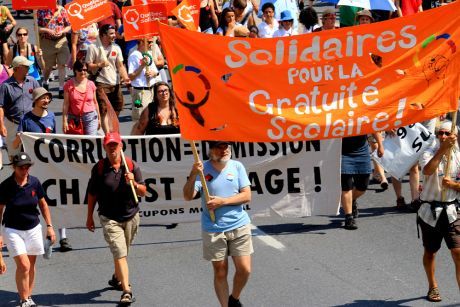Features
You are here
Quebec election: la lutte continue

April 13, 2014
The results are in: Québec solidaire (QS) won a third seat in the National Assembly, and the party garnered 7.5 per cent (an additional 1.5 per cent) of the popular vote, and 323,000 votes (an additional 60,000 over last time).
Objectively, this does not seem like much. So why does it feel like a huge victory? There are several very good reasons for this.
QS gains
First a bit of context. QS is a very young party, only eight years old, and it has waged four general elections and a bunch of by-elections. In the meantime it has managed to adopt three-quarters of a programme (party policy, in the parlance of the old guard political parties), and several party platforms—commitments for a theoretical first mandate of a QS government.
QS is also a party whose membership of roughly 13,000, and its active base is largely made up of activists in social struggles—including the student movement and organized labour, anti-poverty groups, women’s groups, human rights, and the climate justice movement.
So for a party with few resources and little experience, we’ve come a very long way.
More importantly, this election was not so much about the result but also the journey of this specific month-long election campaign. The mood on the ground in districts across the province was optimistic and positive. A significant number of new activists came from the student movement, who radicalized during the massive student strike of 2012.
PQ defeat
A third factor was that the PQ was defeated—no small thing, since it meant the defeat of the xenophobic Values Charter project, which would have banned the wearing of religious symbols and clothing for all public servants. The project was a thinly veiled attack on Muslim women and a cynical play for populist votes.
But the PQ, who counted on riding their upswing in popularity through the five weeks of the campaign, learned that their support was built on sand. Even before the election, those who supported the charter were far from united in their understanding of its meaning and far from agreed that it was any kind of a priority for Quebec.
Liberal ‘majority’
The results of the election were not all positive. The Liberal Party received a majority government mandate, which in our first-past-the-post system meant that a 40-odd-per cent support from the popular vote means about four years of Liberal rule.
These are the same Liberals who were tossed out on their ears in 2012 by the student movement and climate justice movement, and because of their corruption, still under investigation by the Charbonneau commission two years later.
Effectively Quebeckers have traded PQ neo-liberalism, including the Charter and austerity measures such as deep cuts to education, oil exploration in protected waters, etc., for Liberal neo-liberalism, including the Liberals’ Plan nord—a plan to wreck the north for mining corporations’ profits—and their own austerity measures, such as their planned tuition fee hikes which led to the strike in the first place.
La lute continue
It would be understandable if progressive Quebeckers felt as if we had just pressed rewind. But social movement activists know how to fight against a Liberal government and will do so on everything from shale gas to tuition fees.
In contrast, the movements were disoriented and divided in the face of the PQ’s attacks against religious minorities in the name of secularism, women’s rights and gay rights. The devil you know, and love to hate, is better than the devil in a progressive disguise.
The nail-biting last few minutes of April 7, which saw Manon Massé, the third MNA for QS, elected on a 90 vote margin, was symbolic of the reason many people were left feeling so good about it. In a context of global and federal austerity, neoliberal control of the media, and in an era of defeats and defensive struggles for labour and social justice, QS is still managing to grow and increase its influence.
That is a victory on which we can build. The next step is to sink deeper roots in our communities and neighborhoods, supporting and promoting all the movements for social justice, so that the forces of neo-liberalism and climate destruction can be turned back.
Section:










